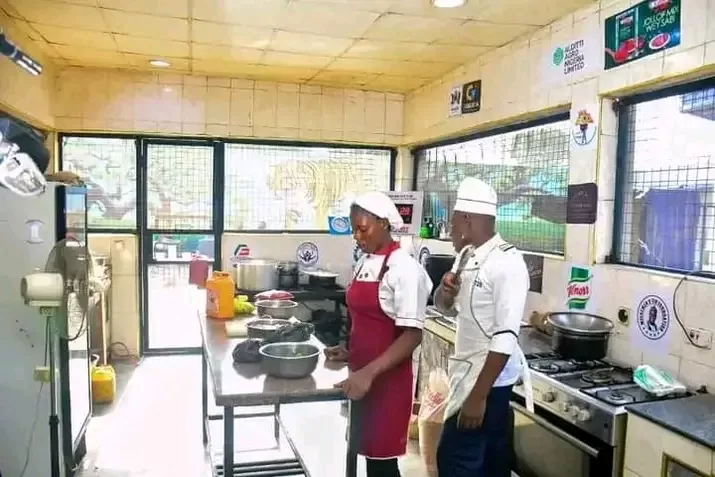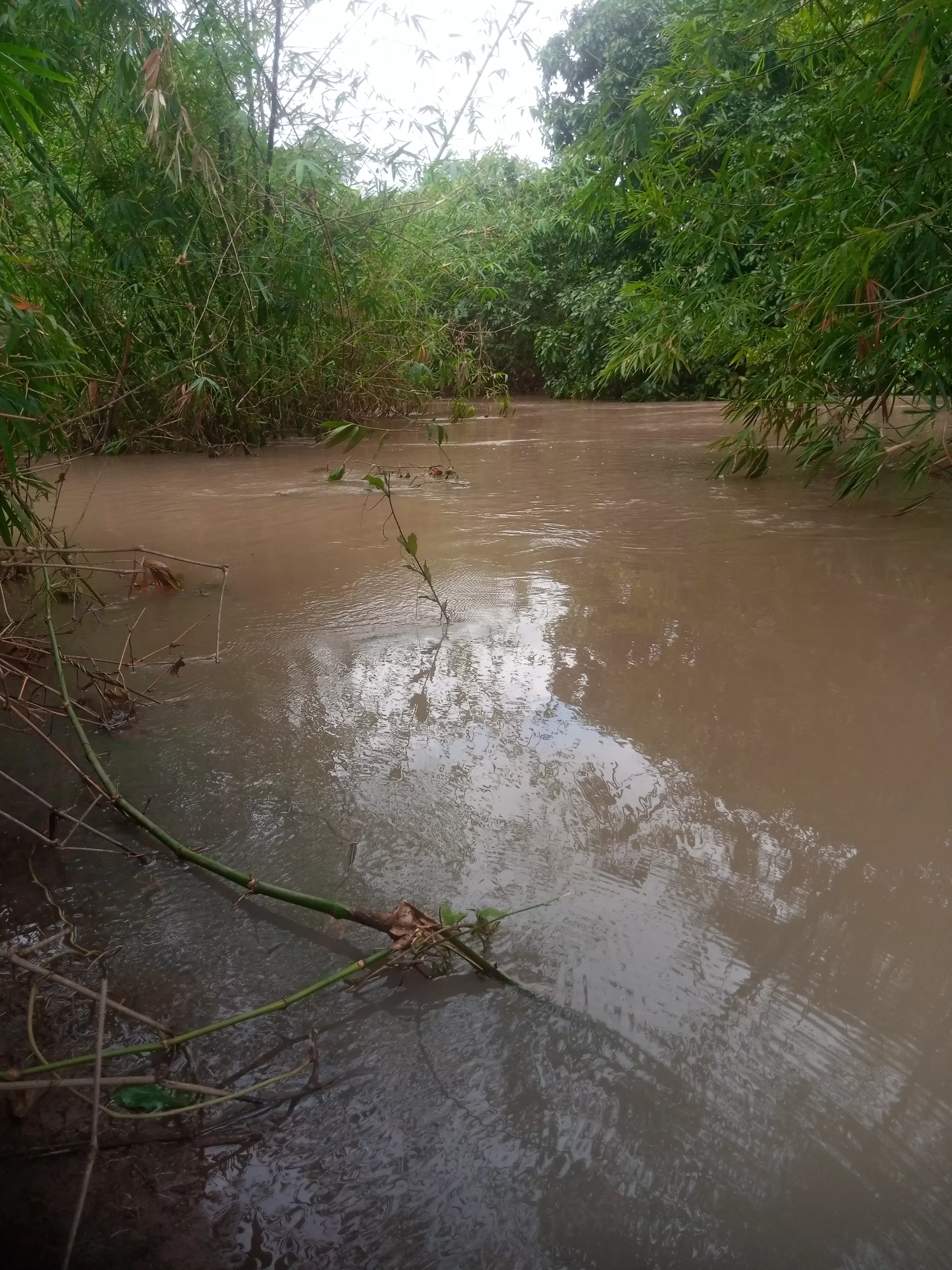Juliana Innocent lives in Unwaba-Oju, a village in Otahe Ward of Otukpo Local Government Area of Benue State in the North-central region of Nigeria. The closest community with a primary health care centre to her village is Ogobia, which lies at the end of a 70 km unpaved road. “While going to Ogobia for antenatal care in March 2021, I had an accident that fractured my leg and hurt my back,” she narrated. Months later when Mrs Innocent delivered a boy, the baby had tremor, an abnormal rhythmic shaking in the arms, feet, hands, head and legs of newborns. “I took the baby to hospital in Ogobia and the doctor said that he was suffering from low blood sugar. We were on admission for two weeks,” she said. But she could not keep up with the baby’s treatment schedule due to the distance of the hospital from her home. “Because of the distance and financial difficulties, I was using herbs and, unfortunately, the baby passed away eight months after delivery.” Mrs Innocent said most people in Unwaba-Oju use traditional herbs when they could not travel to the towns to access health care. “Sometimes you may have money for hospital bills but you may not be able to pay for transport,” she said. Only two of her own seven children were delivered in the hospital. “I had the two when Unwaba-Oju Healthcare Centre was functioning.” Challenges of accessing healthcare in rural Benue communities Mrs Innocent is a victim of the poor state of the primary healthcare system in Benue State. Accessing care can be a life-threatening ordeal, especially for people in the rural areas of the state where the burden of disease is disproportionately high. In some communities, pregnant women and their children travel more than 50 kilometres on motorcycles to access care. This undermines the Sustainable Development Goals (SDGs) target 3.8, and the Nigerian government’s commitment to Universal Health Coverage (UHC), a journey towards making basic healthcare services accessible to citizens through primary healthcare centres. In May 2024, this reporter visited four local government areas in the state to assess their PHCs. The findings are depressing. PHC Unwaba-Oju, Otahe Ward, Otukpo LGA Mrs Innocent’s community of Unwaba-Oju once had a PHC. But residents said it has been abandoned for over a decade. Most of the windows of the dilapidated three-bedroom bungalow were either smashed in or missing. The facility was covered by cobwebs, dirt and dust and had become home for cats, lizards, rats and spiders. Inside the building were abandoned medical equipment, rusted metal bed frames and dirt-covered mattresses. ‘Help us’ “Lack of access to healthcare has affected our community, especially pregnant women and children. When there’s an emergency, we take the patient to neighbouring communities but sometimes there are no means (of transportation),” Sunday Anyebe , the community’s youth leader, told this reporter. “Our women depend on traditional birth attendants and sometimes there are complications and fatalities.” Mr Anyebe appealed to the state government to address the healthcare challenges of the community. “We are appealing to our governor, Reverend. Hyacinth Alia, to come to our aid,” he said. “This community has been without a healthcare facility for more than 10 years. The government should pity our women and children and provide healthcare services and facilities to enhance their quality of life,” Mr Anyebe said. PHC Tse-Indyer, Logo LGA Zugwem Udoji, a 27-year-old housewife, lost her twins during childbirth at the PHC in Tse-Indyer. She said the facility “crushed my opportunity of becoming a mother of twins.” Mrs Udoji said she was six months pregnant when she had a miscarriage. “I woke up that morning in February 2023 to an intense pain around my lower abdomen. When my husband took me to the clinic, there was no medicine to relieve me from the pains.” Mrs Udoji said before the miscarriage, she was going for antenatal but was not tested or checked. “Even if you complain about something abnormal, they will either give you an injection or recommend medicine for you to go and buy,” she said. She still believed she would not have lost her pregnancy if the PHC in Tse-Indyer was adequately equipped. “I know that a hospital is supposed to carry out tests on pregnant women but that clinic doesn’t do that. I would have been a mother to twins.” When this reporter visited Mrs Udoji in her residence in Tse-Indyer, she was carrying a three months old baby she delivered after the loss of her twins. Death of a woman 69-year-old Isaac Toryina lives in a small village called Tse-Torazege, about two kilometres away from Tse-Indyer. The village is located in Mbavuur North-West, 16-17 kilometres from Abeda-Shitile, a major town along the Abeda-Afia road in Mbavuur Ward of Logo LGA. On 27 December 2023, Mr Toryina lost his wife, Ngodoo,10 days after she delivered a baby at home with the help of a traditional birth attendant. Early in the morning of 27 December, she stepped out to urinate but slumped and fell into a coma. Mr Toryina rushed her to the Abeda-Shitile on a motorcycle. Unfortunately, Ngodoo was pronounced dead by the health workers on arrival in the PHC. “My wife delivered at home because there’s no functional healthcare centre in this community. When she was pregnant and unwell, we went to PHC Tse-Indyer but we couldn’t get drugs there,” he said, fighting back tears. “After delivery, we went to a hospital in Abeda-Shitile and extracted mucus from the baby,” Giving a picture of what led to his wife’s death, he said: “We went into bed that night and she was fine. Around 4 a.m. in the morning she stepped out to urinate and stayed beyond usual. I came out and found her lying unconscious. I couldn’t think of that clinic (referring to PHC Tse-Indyer) because even if we had gone there, we wouldn’t have found medicine.” Mr Toryina said his wife might have lived if there were facilities for emergency obstetrics services in his community. “If there were a good clinic in this area, her situation would have been managed and she would have been alive.” Mrs Toryina left behind a five-month-old-child, who is being breast fed by nursing mothers in the community. When this reporter visited Tse-Torazege, his grief and sorrow was palpable as Mr Toryina sat alone on a wooden chair at the entrance of his hut. PHC Tse-Indyer From outside, PHC Tse-Indyer looked like a clinic, but the courtyard was overgrown with weeds. Inside the building there was no ceiling board and the windows were broken. There was no waiting room. Two rickety beds complete the story of neglect. Philip Shingir, the consulting Community Health Extension Worker (CHEW) in charge of the PHC, said it had no electricity, potable water or toilets, adding that the facility had no security guards and a staff quarters. For child deliveries; Mr Shingir said he usually bought water for use, but during the rainy season the PHC staff use rainwater for cleaning, bathing and drinking. “Now that there’s no water, I usually send someone to a nearby town to collect water for the PHC,” Asked what he does in cases of emergency, he said; “I have a motorcycle. I will pick one gallon. From here to Abeda is about 16-17 kilometres,I will go there and get water,” he replied. The PHC was eerily quiet, without power supply, fan or solar lights. The empty medicine stores suggested not much was going on at the facility. No rooms designated for male and female patients. A few metres away from the delivery room are two clinical toilets which the health workers have turned into their sleeping quarters. Mr Shingir said the government only supplies antimalarial drugs to the clinic. “We can only test and treat common malaria infections here, not severe ones,” he added. “If there’s patients here, sometimes I use my personal money to buy medicine in Abeda for treatment. But we don’t accept in-patients, we prefer bed-rest because we lack capacity to do so,” Asked if there was child delivery at night, he said “We can use local light or a handset that has light.” “We only have one bed in the maternity section. “If there are two women delivering at the same time we will look for a mat. The woman that is closer to deliver will stay on the delivery bed while the other one will sleep on the mat.” Is the government aware? “Yes. The government does come for supervision and we equally give reports on the status of the health centre,” Mr Shingir responded to the question. The signage at PHC Tse-Indyer indicated that the centre was built by Logo Local Government Council and commissioned on 12 February, 2012 by George Akume, the governor of the state at the time. PHC Awulema, Ohimini LGA Mercy Inalegwu, a mother of two, reflected on the past when newborns were checked for jaundice before leaving PHC Awulema. She said lack of equipment at the centre to check their bilirubin levels led to the death of three of her children. “The first children were twins in 2005, a boy and a girl. I delivered at home because this hospital (referring to PHC Awulema) had nobody there. The girl passed at birth but the boy lived for four days and passed away,” Mrs Inalegwu recalled sorrowfully. She hadn’t known that newborns are supposed to be checked for jaundice before leaving a birth centre, until her sister told her. “When I lost my first two children, I explained what happened to my sister who stays in Port Harcourt and she told me it was jaundice. In 2009, I had twins again – both boys. One died immediately, I then followed my sister’s instructions by placing the living boy in the sun every morning and he survived,” she said. “If there is a healthcare centre here in Awulema and there are health workers inside working, I wouldn’t have lost my children because it was just a similar case of jaundice. I am sure they would have noticed it,” she said. In Awulema, Ohimini LGA, accessing quality healthcare service at home is a mirage. The inhabitants travel to Otukpo to seek care or use herbs at home. The PHC Awulema is in Oglewu Ehaje ward, along the Otukpo-Enugu road. The desolate facility is evidence of the serious deterioration in public health services in Benue State. The facility is collapsing with its untended garden growing wild. The only signs of life within the PHC at the time this reporter visited were the sounds of mice scuttling and scavenging for what had been left in the building. Clement Okwubi, the head of Awulema village, has lived in the village for over 40 years. He said residents depend on herbs due to poor health care services in the community. “When one is sick, there are herbs that we use for treatment – when it is above us, we rush the person to Otukpo.” The retired agricultural officer said poor health care service in his community had caused his people suffering, deaths and loss of function. “Those who cannot afford to seek medical care in Otukpo are giving up on life,” he said. Due to the deplorable state of the PHC, the health workers have been relocated to an abandoned hospital project of the federal government in the community. But when this reporter visited the place, no one was seen at the facility. Asked about their whereabouts, Barack, not his real name, said: “They hardly come to work and even when they come they don’t stay long.” PHC, Tse-Kpum, Vandeikya LGA When this reporter visited Vandeikya in May, it was hard for him to locate PHC Tse-Kpum, as the facility is sandwiched between houses, along the Adikpo Vandeikya express road. You have to pass through people’s compounds to access the centre. The first thing you notice is that the walls of the old decrepit buildings are crumbling. The facility is two mud blocks of […]
Benue state
In an effort to develop the health sector and industrialize the state, the Benue state government has signed a memorandum of understanding with Shanghai Haitian Hospital and Sinoki Systems Limited in the areas of Health and energy development.
The Governor of Benue State and Secretary to the government of the federation have reportedly reconciled their political differences after a meeting with the Tiv Traditional Council (TTC), on Monday. The reconciliation took place on Monday after a cold war between the supporters of the two individuals had lasted for the past six months a situation that has also brewed the crisis of the rulling political party in the state. The conflict hit a peark with the recent inauguration of a factional APC State Executive Council by the governor, a development that saw the police stepping in to take over the APC State Secretariat to forestall violence. Worried by the worsening crisis, the Tiv paramount ruler, Prof. James Ayatse, and the TTC invited the duo to discuss the differences. Prof Ayatse, while briefing newsmen on the outcome of the meeting yesterday, said that the duo agreed to reconcile their differences. “The two leaders have agreed to put aside their political differences and work for the progress of Benue. “Today, I called the Governor of Benue, Rev Fr Alia, and the SGF, Sen George Akume, to discuss with them because of reports that we have received about conflicts between them. “We have spoken with them. They have told us the issues. We discussed the issues and agreed together. “They agreed to bury their differences and work together as a team for the good of the people. “So, all the past differences have been put aside and now we have a fresh start. We shall work together in unity, in cooperation, and in agreement for the progress and development of Benue. “The leaders have made a commitment to keep to their word and ensure that there is peace and unity between them going forward.” He said the SGF and the governor understood the weight of making an undertaking before the fathers of the land and shall, God willing, abide by their words. “Yes, they made a commitment. They shook hands and embraced one another. They have promised to work as a team. “We are happy with the resolutions they took themselves and we believe they have shown commitment. We are their fathers in the land; our blessings have a lot of importance in their activities. “So, to make such a commitment in the presence of the traditional rulers of the land is very weighty. We do believe that they will adhere to the resolutions that we have reached today,” he said It was reported that Barnabas Gemade was Gov Alia’s witness during the reconciliation meeting, and Michael Aondoakaa, a Senior Advocate of Nigeria, was Mr Akume’s witness. The two officials the SGF and the Governor declined to respond to questions from the press. (NAN)
By Manasseh Mbachii Benue State chef, Victor Tartenger has embarked on a remarkable 135-hour culinary journey to set a new Guinness World Record for the longest cooking marathon by a single individual. Victor who is popularly known as Naira-Victor began his cook-a-thon on Tuesday, February 27, 2024, in Makurdi the Benue State Capital, and is scheduled to conclude on Sunday, March 3rd, 2024 The record-breaking attempt by the Benue Born Chef is coming after Alan Fisher, an Irish restaurant owner, and chef based in Japan, broke the cooking marathon by an astonishing 119 hours and 57 minutes to displace Nigerian Hilda Baci’s who held the record from May 2023 till November 2023 Chef Victor, who hails from the Food Basket of the Nation, aims to push the boundaries of culinary endurance with the intention to share 70% of the food cooked during his days in the kitchen with the Internally Displaced Camps within the State. Confirming the record-breaking attempt Guinness World Records indicated that Victor Tartenger received approval from the GWR on December 17, 2023, to set a new cooking marathon record in Makurdi Benue State of Nigeria to cook for about 120 hours plus to dethrone the award-winning Chef Irish Alan Fisher. Nigerians eagerly awaited the outcome, as hundreds of supporters were seen at Tiger Bar in Makurdi Benue State to witness Naira-Victor’s extraordinary cooking marathon in setting a new Guinness World Record. The recent attempt by Victor is among several others that have attempted to break the record after Hilda Baci did in May 2023.
By: Manasseh Mbachii Makurdi, the Benue state capital, is at risk of an epidemic outbreak due to poor waste management in the metropolis. This is in spite of the millions approved for environmental improvement by the Benue State government. Through the Ministry of Environment and Water Resources, the state government in the 2021/2022 budget, approved 198.2million for the acquisition of land, waste containers, septic tanks, medical equipment, garbage trucks, payloader, and waste collection vehicles to remediate water pollution in the state capital. Despite budget approval to the Benue State Environmental and Sanitation Authority (BENSESA) to curb the menace of poor waste management in the state capital, very little progress has been made as Makurdi residents continue to face a growing waste management crisis due to poor waste collection in the state capital. Residents who spoke with this reporter shared a heartfelt story of painful diarrhea and persistent typhoid fever accompanied by bouts of severe stomach cramping and stooling caused by the regular consumption of contaminated water. In Wurukum, Makurdi South, a sinister sickness gripped the family of Terfa Comfort, a food vendor, with unfamiliar illnesses, primarily marked by diarrhea and typhoid fever. Mrs Terfa stated that open-dug wells in Wurukum are polluted, and reeked of the environment due to unapproved refuse dumpsites in an undeveloped commercial plot of land in the community. She further lamented that the obnoxious odor from the refuse site had negatively impacted her health and food business. “This refuse site has been a health hazard to my family. My children are the ones mostly affected by typhoid due to improper waste disposal. I also experience low patronage due to the odor that takes over the atmosphere from the waste site,”she said. When this reporter visited the High Level Market in Makurdi, the center of the state capital, to assess the sanitation and hygiene of the people, It was observed that the community was littered with waste. Residents and shop owners adorned a section of JS Tarka Foundation with heaps of refuse. Gift Odo, who sells kitchen utensils at the High Level Market, stressed that the odor emanating from the refuse in the axis had exposed her to consistent stomach disorder. She lamented that the situation has chased customers from patronizing her. “You can see and smell things for yourself. From the odor, I have constant stomach cramping. Sometimes, customers would want to buy something but because of the odor, the person will just drive away. Nobody cares to come to pack the refuse, even though we paid taxes,” Ms Gift said. In Akpehe, a 48-year-old mother of four children, Akaayar Judith, said her children have been suffering unexplainable illnesses every time they drink water collected from an open-dug swell. “My children just started stooling, while the youngest was complaining of stomach pain. I bought medicine for them but nothing changed. When we went to the hospital, we were told that the water we were consuming was harmful. The doctor said waste contaminates groundwater as well as pollutes nearby open wells,” she said. Investigations by this reporter however showed that residents are in the habits of indiscriminate dumping of refuse in available spaces especially markets, drainages and open space in residential areas due to nonavailability of waste containers. Expert weigh in A clinical epidemiologist and public health expert at the Benue State University Teaching Hospital, Terkaa Bitto, explained that decay from uncollected waste infiltrates water sources through the overflow of septic tanks and sewage. He warned that viruses, bacteria and fungi from such waste are cataractogenesis, which could affect unborn children through mothers with cognitive defects. “When there is an overflow of septic tanks and sewages, the viruses could be easily washed into public open wells. Pathogens from the waste could be blown into the air and become airborne viruses and bacteria which humans can easily inhale. Some of these bacteria have short and long-term effects and can stay in the human system and cause neurological defects in children. The ramifications of improper waste disposals are huge,” he said. Doctor Bitto, said that the best measures for proper waste management are to create waste segregation and recycling centers. A professor of Analytical and Environmental Chemistry at the Joseph Sarwuan Tarka University, Makurdi, Professor Ishaq Eneji, warned that there could be an epidemic outbreak if there is no immediate remediation to checkmate further contamination of water, especially in River Benue. “Most of the waste are hazardous chemicals and their possible health risk in the environment can cause neurological and kidney damage while persistent organic pollutants can cause reproductive and developmental problems, damage the immune system, interfere with hormones and cause cancer.” State government’s reaction The Benue state Ministry of Environment and Water Resources could not respond to questions on the multimillion naira waste management projects, after an official letter of enquiry was submitted to the ministry. “Your letter is with us. When we look at it, if there is any reply we will get back to you” Mr. Ali Efu, permanent secretary, ministry of environment and water resources, said. Several attempts to speak with the Benue State Environmental and Sanitation Authority (BENSESA) were not successful, as officials declined comments. However, a staff member who pleaded anonymity told this reporter that the agency does not have the funds to effectively manage waste in the state capital. “When Gov. Hyacinth Alia came here and ordered the agency to clean up the town, the secretary borrowed money to fuel vehicles,” the staff said. This report was produced under the UDEME project of the Centre for Journalism Innovation and Development (CJID). Edited by Kemi Busari.
In July 2023, UDEME, in a bid to get the details of the contractors and the amount released for the project, sent a Freedom of Information (FOI) Letter to the Ministry of Water Resources and Environment in Makurdi. A response was not provided.







